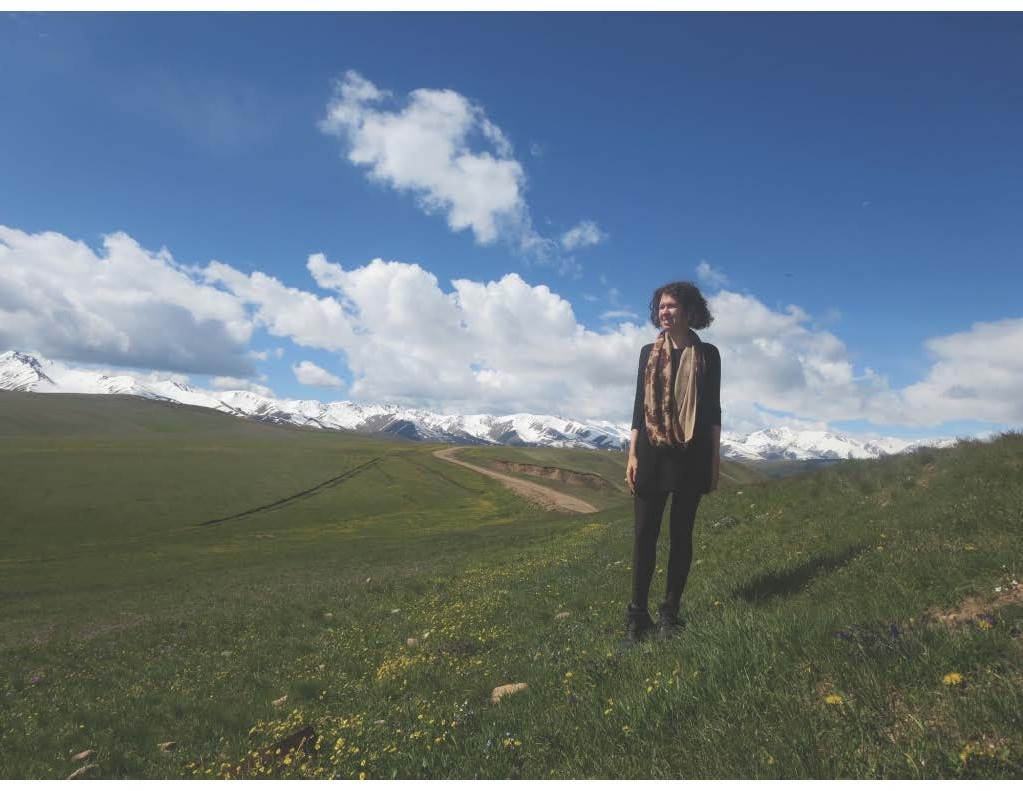Caroline Elkin ‘15
Russian and International Studies Major; 2015-2016 Research Fulbright to Kazakhstan)
If they haven’t yet, I guarantee that the Russian Department professors will tell you about Fulbright. You will be invited to events to learn more about these fellowships, and then your professors will bring it up again. If you are like me, you will nod solemnly while thinking, “I don’t want to teach English, and I’m not one of those super-academic types.” You will walk out of Bosler believing that Fulbright may be great for other people, but certainly not for you.
That’s what I thought, and I was wrong.
I changed my mind in late April, in Moscow. The email made the same subtle hint about Fulbright as usual, but instead of envisioning weird-smelling libraries, I thought of what I liked: wandering around the city by day and digging through Russian websites to learn more about the landscapes around me by night. I wasn’t trying to “do research” or “be academic.” I was just getting really excited and working really hard.
I blinked and saw the word again. Fulbright. Fast forward through a year of essays, feedback, and waiting, and I was selected to go to Kazakhstan. Another year later, I’ve worked in archives, presented at fancy conferences, studied a new language, and encountered lots of inspiring people (scholars and normal human beings alike). I’ve had fun, worked hard, tried new things, and made myself very proud.
If this sounds like something you’d enjoy, I highly recommend applying for Fulbright. Since other people also make this recommendation, I’ll modify it by addressing some reasons you may not want to apply for Fulbright.
For a long time I believed “academia” meant “abstruse literary criticism about depressing Russian novels.” It doesn’t. Think of a research Fulbright as a chance to spend ten months obsessing over whatever you’re obsessed with—in my case, Soviet-era architecture and ideas of nature—in order to figure out ways to keep obsessing over it. Because focusing on one topic meant I could work with so many people, from universities to architecture studios to journalists, I found many more ways to explore what motivates me.
The research Fulbright also entails a lot of independence. Your relationship with your host institution is yours to control, and nobody is demanding term papers from you. While this can scare some, I’ve seen many different personality types thrive in this environment. You don’t have to live in a library to be a Fulbrighter; you have to be a person who wants to interact with other people and is capable of expecting things from yourself.
While not everyone dreams of a PhD, I think these qualities of being excited about something, knowledgeable enough to pursue it further, and willing to share your knowledge and learning process with other people are much more common. Yes, you are a potential researcher.
Moreover, you have the opportunity to be excited about this topic while gaining a much more nuanced view of the former Soviet region, as well as some culinary delights, stunning landscapes, and all the other attractive things in life. At first I struggled to imagine myself anywhere other than Moscow, but as I learned more about Almaty—and especially once I ended up there—I realized that Kazakhstan, and Central Asia, is a fantastic place.
Kazakhstan has large, livable cities (Almaty has nearly two million residents, yet I lived within a block of numerous landmarks) with bazaars full of produce from Uzbekistan, Korean salads, everything you ever needed to furnish your apartments, and horse heads for that Godfather feel. I spent most weekends developing a newfound love for mountain hiking or hanging out with my friends—incidentally, perhaps due to a tradition of openness and hospitality, it’s very easy to meet and genuinely befriend people in cafes or casual settings. Russian will help you get around, and may be the only language you use, but you’ll be able to learn very different languages too.
For me, another benefit of Almaty was the ability to get things done. Significantly fewer foreign researchers compared to Moscow meant that I had more attention from scholars and librarians; it also means that you have more chances to work on special projects. For example, I translated a full-length article, led a few workshops at one university, and co-organized a two-day conference at another. While you shouldn’t expect special treatment, there’s nothing wrong with putting yourself in opportunity’s way.
That said, it’s not so much about where you choose as the reasons for which you choose it. I’ll confess that I settled on Almaty more of practicality (Russian-speaking, politically stable, not freezing cold) than passion but fortunately ended up loving it. That reasoning is too close to the belief that all post-Soviet countries are alike. The tools you gained in Moscow will help you adjust; they do not exist for you to build a copy of a different world.
On that note, I hope not only that you take a second or third look at Fulbright, but also that you seek out other ways to do whatever excites you and to learn new things. You might want to investigate the Critical Language Scholarship in order to spend time in many other post-Soviet countries. Or, to kick off the new semester, you can look for ways to explore new things. Walk around Carlisle. Try a new activity. Talk to your professors and Google things till you find a research topic that’s genuinely intriguing. Without those last three, I wouldn’t have applied for Fulbright, and that is one of the best decisions I’ve made.
